Archive for November, 2010

Study: Girls take more chances during first sex
 (CNN): Even though teenage boys are known for their risky behavior, it’s girls who are more likely to engage in unprotected first sex, according to research presented Monday at an American Public Health Association meeting in Denver. Nicole Weller, a doctoral student at Arizona State University, analyzed government data and found adolescent girls were 30 percent more likely than boys to have sex without contraception during their first sexual encounter. Weller said that surprised her. “It does because of the history of boys engaging in risky behavior across the spectrum and then seeing that females are having first unprotected sex is telling a different story,” Weller said.
(CNN): Even though teenage boys are known for their risky behavior, it’s girls who are more likely to engage in unprotected first sex, according to research presented Monday at an American Public Health Association meeting in Denver. Nicole Weller, a doctoral student at Arizona State University, analyzed government data and found adolescent girls were 30 percent more likely than boys to have sex without contraception during their first sexual encounter. Weller said that surprised her. “It does because of the history of boys engaging in risky behavior across the spectrum and then seeing that females are having first unprotected sex is telling a different story,” Weller said.

Internationally renowned author to visit Cayman
 (CNS): One of the world’s most famous modern writers, Salman Rushdie will be visiting the Cayman Islands this month. Described by organisers as a “once in a lifetime opportunity to meet one of the most celebrated and controversial writers of our time,” Cayman’s readers will be able to join the number one New York Times bestselling author and “Best of the Booker” prize winner for a discussion and signing of his new book Luka and the Fire of Life. The event will begin in Gardenia Court, Camana Bay on 19 November when Rushdie will treat the public to an intimate presentation and reading before taking questions from the audience. The discussion will be immediately followed by a book signing at Books & Books.
(CNS): One of the world’s most famous modern writers, Salman Rushdie will be visiting the Cayman Islands this month. Described by organisers as a “once in a lifetime opportunity to meet one of the most celebrated and controversial writers of our time,” Cayman’s readers will be able to join the number one New York Times bestselling author and “Best of the Booker” prize winner for a discussion and signing of his new book Luka and the Fire of Life. The event will begin in Gardenia Court, Camana Bay on 19 November when Rushdie will treat the public to an intimate presentation and reading before taking questions from the audience. The discussion will be immediately followed by a book signing at Books & Books.
Rushdie’s fame as a post colonial writer is not just as a result of the quality of his work but because of the international controversy it has stirred. His fourth novel, The Satanic Verses, lead to accusations of blasphemy against Islam and the Iranian leadership issued a fatwa against Rushdie in1989 – effectively a death sentence – forcing him into hiding under the protection of the British government. The fatwa was lifted in 1998.
Since Satanic verses Rushdie has gone on to write a serious of novels, non-fiction books and screenplays. Midnight’s Children which was his first work and one of his most famous, was awarded the Booker Prize in 1981, the Booker of Bookers in 1993, and, in 2008, the Best of the Booker.
His latest work Luka and the Fire of Life is described by critics as a “thrilling, delightful, lyrically crafted fable for the young and young at heart,” which begins one beautiful starry night in the land of Alifbay.
Luka’s father, Rashid, the legendary storyteller of Kahani, falls suddenly and inexplicably into a sleep so deep that nothing and no one can rouse him. To save him from slipping away entirely, Luka must embark on a journey through the world of magic with his loyal companions, Bear (the dog) and Dog (the bear). Together they encounter a slew of fantastical creatures, strange allies, andchallenging obstacles—all in the hopes of stealing the Fire of Life, a seemingly impossible and exceedingly treacherous task but one that must be done in order to save Luka’s father’s life.
Written for his youngest son, Milan, Luka and the Fire of Life is a companion to Rushdie’s earlier novel, Haroun and the Sea of Stories, which he wrote for his eldest son, Zafar. The story is a classic quest myth exploring the relationships between fathers and sons, life and death, the real and the imagined, freedom and authority. Filled with frolicking wordplay and unexpected twists, and fueled by the power of words and the imagination, this is Salman Rushdie at his best.
“It has been my aim, in Luka as in Haroun, to write a story that demolishes the boundary between ‘adult’ and ‘children’s’ literature. A child may read these books and, I hope, derive from them the pleasures and satisfactions that children seek from books. The same child may read them again when he or she is grown, and see a different book, with adult satisfactions instead of (or as well as) the earlier ones. Luka and the Fire of Life has been the most enjoyable writing experience I’ve had since I wrote Haroun and the Sea of Stories.” – Salman Rushdie said of his latest work.
This free event is open to the public on Friday, November 19 at 7pm. It is part of the Books & Books International Visiting Author Series and is generously sponsored by Ogier.

No help for merchants
 (CNS): A proposal to try and boost sales for local merchants by requiring developers given a duty waiver to ‘buy local’ has failed. A private members motion brought by the independent MLA for North Side was altered so much by government in the Legislative Assembly that it removes any obligation on the part of those given the waivers to buy from Cayman dealers. Ezzard Miller had called on government to use the duty waiver as a way of assisting local traders who were struggling to keep their doors open and in some cases laying off staff. In his motion, Miller asked that anyone given a duty waiver as a carrot to encourage development must purchase goods locally in order to access the waiver.
(CNS): A proposal to try and boost sales for local merchants by requiring developers given a duty waiver to ‘buy local’ has failed. A private members motion brought by the independent MLA for North Side was altered so much by government in the Legislative Assembly that it removes any obligation on the part of those given the waivers to buy from Cayman dealers. Ezzard Miller had called on government to use the duty waiver as a way of assisting local traders who were struggling to keep their doors open and in some cases laying off staff. In his motion, Miller asked that anyone given a duty waiver as a carrot to encourage development must purchase goods locally in order to access the waiver.
However, rather than voting ‘no’ to his motion the government submitted a private members motion amendment via backbencher Ellio Solomon, changing Miller’s original proposal from a legal obligation to buy local to get the waiver to the possibility of getting a higher discount on the duty if they chose to buy locally. It was not clear however, how that would work for those developers given a 100 percent duty reduction.
Rolston Anglin the education minister described Miller’s original proposal as “fatally flawed” because not all goods are available on island and developers would have to source many things they needed overseas.
The independent member for North Side pointed out that in such cases the developers would simply not get the duty – which was the point of the motion – and that he had worded it carefully to ensure that it had the guts to properly assist the local merchants. “This change will be of no benefit to them,” Miller told CNS after he was forced to vote against his own motion that was “hijacked by the government and neutered.”
Miller said he was disappointed and could not understand why government did not just vote ‘no’ if they did not agree with him. However, he said if nothing else the debate had revealed the fact that prior to the motion government did not have a policy to encourage developers to buy locally at all and at least now they were offering some encouragement.
The problem he said, however, was that the merchants were still left trying to scrape a living in tough times while the major developers who were purchasing materials and goods for their projects were simply by passing the local economy and despite getting the duty benefit were not spending their money in the Cayman domestic economy.
Miller pointed out that in some circumstances when developers simply ignored local retailers the point of the waiver to encourage development was lost. When government is deriving no revenue as there is no duty and the merchants are not benefiting either it was hard to see who other than the developer benefitted.
As well as trying to assist struggling traders Miller said that if more of the major developers were obligated to buy locally then the merchants themselves would be able to reduce their prices as they would be able to buy in bulk and access better prices which would in turn benefit everyone.
During his presentation in the House Miller had pointed to local developer Frank Hall who specialises in low cost properties as an example as he always buys his material through local traders. The independent member from North Side pointed said if Hall can do it when constructing homes where cost is significant and profit margins small, the larger developers selling units for millions of dollars with much greater profit margins would find it even easier to shop locally. “They must be made to have a social conscience,” Miller added.
Facing what he called the “Ellioanisation” of his motion Miller said he had done his duty by the people who had made representation to him that local businesses needed help and said his motion had been drafted to assist people. In difficult times, Miller added that he believed government should assist the people but that this altered motion would be of no substantial benefit.
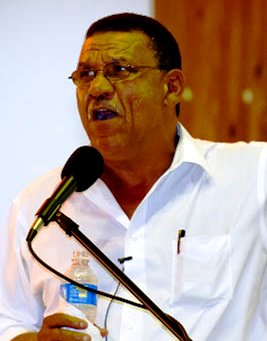
East Enders will fight dock
 (CNS): Over 150 people came out to a meeting regarding proposals to develop a commercial seaport in East End on Monday night and few, if any, were in support. The district’s elected representative Arden McLean told the people he was prepared to lead the opposition to the project from up front but the people would have to raise their voices and stand against it as the government had already revealed its support for the proposal. Prior to the public meeting demonstrating the considerable opposition in the community, the premier had said on Monday morning that few developments were ever supported by everyone and this one had the potential to bring in tremendous revenue. (Photo Dennie Warren Jr)
(CNS): Over 150 people came out to a meeting regarding proposals to develop a commercial seaport in East End on Monday night and few, if any, were in support. The district’s elected representative Arden McLean told the people he was prepared to lead the opposition to the project from up front but the people would have to raise their voices and stand against it as the government had already revealed its support for the proposal. Prior to the public meeting demonstrating the considerable opposition in the community, the premier had said on Monday morning that few developments were ever supported by everyone and this one had the potential to bring in tremendous revenue. (Photo Dennie Warren Jr)
At the meeting in his constituency McLean made it clear he opposed the development from a personal position but wanted to know how the people that elected him felt, and it was apparent from the response to his presentation that the audience agreed with his opposition. McLean revealed what he knew of the proposed development by Joe Imparato, with whom he had recently met.
McLean listed the various concerns from the belief that the canal to accommodate the ships would lead to contamination of the fresh water resources in the district by the eventual seepage of sea water into the underground lens, which would eventually deplete the area’s forests.
He spoke of the loss of several key dive sites in the area, as well as long term major environmental damage, the pollution, the quarrying on the fill (the main purpose of the development), the undermining of the local quarrying business, the dangers of the extensive flooding that would be caused in storms, the loss of the scenic road into East End, the cost of new roads which would have to be paid for by the public purse, and the probability that East Enders would be unlikely to derive any benefit.
McLean pointed out that during the first few years of the project as the developer excavated the fill from the area there would be no more than a handful of jobs, and that by the introduction of a specialist corporation to construct the port the developer would be able to by-pass the normal planning and other regulations.
"We have to stop this now," he said, warning that as a member of the minority opposition, if the proposal gets as far as the Legislative Assembly then he could not stop it. "I am here to lead you right up front and we need to send a message and we need to say it loud enough."
Answering McLean’s questions in the Legislative Assembly on Monday morning, McKeeva Bush made it clear that government was waiting to see the developer’s business plan, an economic impact assessment and an environmental impact assessment (which he is commissioning himself) but it believed the proposal had the potential to bring in “tremendous revenue”. Though he said at this stage the government knew no more about the details than what had been revealed in the public statement by Imparato recently. he said, “The developer has submitted a concept; that’s as far as it goes,” adding that it was one he believed in.
The premier did state, however, that he believed that a cargo port should not be in George Town. He said he had had always supported the notion of a commercial port in the North Sound, as he believed it was a natural harbour, but he could not get a proposal or the support for that. However he did support this idea for East end and, if it had started when he was in office the last time, it would be finished by now and be bringing in revenue.
He said he believed in the future financial viability of the project and there was money to be made in transshipment and the other proposals the developer had for the facility. Although others have doubted the viability of Cayman becoming involved in the shipping sector, Bush has said he believes it could be a source of money for the islands. He said he remained to be convinced that a commercial port couldn’t generate “tremendous revenue” for the country and had it already been constructed government would not have had to introduce all the recent fee increases.
Despite the opposition to the idea, he said that people generally come around to things once they have been finished and saw how good they were. The premier said that everyone had said that the Ritz-Carlton and Camana Bay were the worst things in the world when they were proposed. “I have never seen a project go that everyone supports,” Bush added. “They call you names and then ten years alter they say what a good thing it is.”
The premier accuse the member for East End of making opposition to the project but when everything was in hand he would go and talk to the people of East End about the proposal. He said the project had to be to the satisfaction of Cabinet before it would get support from government.
Bush confirmed that Imparato was currently drafting a proposal for special legislation that would create a similar development zone to that created for the London Docklands Development in the UK, ring fencing the facility from existing legislation regarding permits and zoning issues during its development phase. He said that government would be happy to pass the law if it was satisfied with the project once the assessments were confirmed.
The planned public meeting in North Side to be hosted by Ezzard Miller has been postponed until 7 December as a result of problems at the district civic centre.

DEH urges lunchbox safety
 (CNS): Department of Environmental Health (DEH) staffers are reminding parents that when it comes to preparing school lunches it is vital to follow good food-safety practices to help prevent their children from catching food-borne illnesses. These include keeping food-preparation areas clean, washing hands with antibacterial soap and warm water before handling food, cleaning cutting boards, dishes, utensils and countertops with hot water and a sanitizer or antibacterial soap. The DEH also advises against allowing pets to jump on kitchen counters, and reminds parents to return perishable foods, like cheese, deli meats and mayonnaise, to the refrigerator promptly after preparing lunch.
(CNS): Department of Environmental Health (DEH) staffers are reminding parents that when it comes to preparing school lunches it is vital to follow good food-safety practices to help prevent their children from catching food-borne illnesses. These include keeping food-preparation areas clean, washing hands with antibacterial soap and warm water before handling food, cleaning cutting boards, dishes, utensils and countertops with hot water and a sanitizer or antibacterial soap. The DEH also advises against allowing pets to jump on kitchen counters, and reminds parents to return perishable foods, like cheese, deli meats and mayonnaise, to the refrigerator promptly after preparing lunch.
“We can do much to keep our children safe from food-borne illnesses if we only observe the following safety guidelines,” advised DEH Senior Food Safety Officer Gideon Simms:
The DEH says to pack lunch in the morning, not the previous night, to ensure that cold foods are cold before packing them in a lunchbox, keep food in insulated lunchboxes at a safe temperature until it’s time to eat. They also advise using icepacks for sandwiches made with items such as luncheon meats, cheese and tuna salad so they will be safe to eat, even after two to three hours outside of a refrigerator. Pack a frozen juice box or an ice pack in the lunchbox to help cold food stay cold. Keep hot foods hot, such as soups or stews. In the morning, bring to a boil and then pour into a hot, clean vacuum bottle (bottles can be disinfected with boiling water). Use food within the recommended ‘use-by’ dates.
At school tell your kids to store lunchboxes in a cool place, out of direct sunlight, place dairy products such as milk and yogurt inside a refrigerator, and remind them to always wash hands before eating and never to eat food that tastes or smells ‘funny’.
Lunch foods that can be eaten at room temperature include peanut butter, jams and jellies, breads, crackers and cereals, washed fruits and vegetables, dried meats such as beef jerky, and baked products such as cookies and cakes. Canned meat or poultry products can also be eaten immediately after opening.
For more information on food safety, please contact DEH at 949-6696.
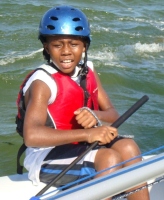
2010 Scotiabank Youth Nationals
 (CNS): Windy conditions made for exciting racing at the 2010 Scotiabank National Youth Sailing Championship. The regatta, which determines Cayman’s best youth sailors, was held on the 30 and 31 of October at the Cayman Islands Sailing Club (CISC). Racing was held in the Optimist and Pico classes. After 25 races, Prospect Primary School sailing star, Allena Rankine, who won the Optimist class in 2009 again retained the 2010 title. In second place was Savannah Primary School racer, Matthew Whorms followed by Jhonny Wight from St. Ignatius who finished in third place. Cayman Prep student, Ben Williams, topped the Pico singlehanded division, followed by his schoolmates Florence Allen and Thomas Bishop.
(CNS): Windy conditions made for exciting racing at the 2010 Scotiabank National Youth Sailing Championship. The regatta, which determines Cayman’s best youth sailors, was held on the 30 and 31 of October at the Cayman Islands Sailing Club (CISC). Racing was held in the Optimist and Pico classes. After 25 races, Prospect Primary School sailing star, Allena Rankine, who won the Optimist class in 2009 again retained the 2010 title. In second place was Savannah Primary School racer, Matthew Whorms followed by Jhonny Wight from St. Ignatius who finished in third place. Cayman Prep student, Ben Williams, topped the Pico singlehanded division, followed by his schoolmates Florence Allen and Thomas Bishop.
The racing was closest in the Pico doublehanded fleet. On the final day of racing, Cayman Prep sailors, Gabbi Nelson and Doug Rowland overtook the Prep/Prospect Primary School team of Adrian Pasquali and Walden Kidd. Prep sailors Sammy Bailey and Keegan O’Connor finished third.
This year’s event was comprised of many novice sailors racing for their first time.
Sailing Director, Michael Weber, noted that the number of young sailors is a promising sign for Cayman. “Some of our top racers are now too old for youth sailing and are busy planning their adult sailing careers. The good news is that we still have a very large base of sailors ready to start racing.”
Some of the winning sailors were handpicked by the CISC’s Talent Identification Programme. Allena Rankine, Matthew Whorms, and Walden Kidd all hail from the Club’s school sailing lessons, which is funded by the Cayman Islands Ministry of Sport.
Weber also thanked Scotiabank for its continued sponsorship, “It really means a lot to the CISC that Scotiabank sponsors this annual event and we are grateful for its continued support for youth sailing in the Cayman Islands.”
For more information, please visit its Facebook page: Cayman Islands Sailing Club.
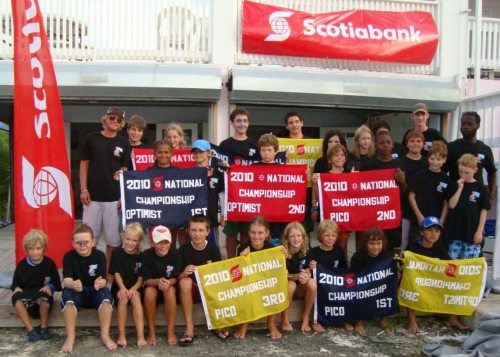
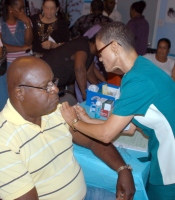
Minister urges seniors to make best use of healthcare
 (CNS): At the Seafarers Association annual Wellness Fair, Community Affairs Minister Mike Adam urged seniors to use the CAY Health Programme, which is geared at improving healthcare access. The programme, which is a collaborative effort between the ministry, the Department of Children and Family Services (DCFS) and the Health Services Authority (HSA), affords seniors access to a personal physician at a local health centre and enables them to collect medication without leaving the district, HSA’s Dr Orrett Thane told those present, noting that it also provides health education and healthy lifestyle advice.
(CNS): At the Seafarers Association annual Wellness Fair, Community Affairs Minister Mike Adam urged seniors to use the CAY Health Programme, which is geared at improving healthcare access. The programme, which is a collaborative effort between the ministry, the Department of Children and Family Services (DCFS) and the Health Services Authority (HSA), affords seniors access to a personal physician at a local health centre and enables them to collect medication without leaving the district, HSA’s Dr Orrett Thane told those present, noting that it also provides health education and healthy lifestyle advice.
Minister Adam said, “Your health and well being are of paramount importance to us. We aim to provide you with the necessary support to enable you to continue realising your potential during this rich period of your lives. You represent a most important population segment and I thank you for your effort in building solid communities and for continuing to make a positive difference in the country.”
Part of Older Persons Month, the fair was celebrated on 20 October under the theme Older persons in Economically Challenging Times.
Seizing the opportunity to remind the seniors to participate in Census 2010, DCFS Director Deanna Look Loy told them that the exercise would enable government to plan more effectively. That, she said, would in turn lead to improvements in the healthcare and other services they receive.
The Wellness Fair also saw presentations from several others who offered the seniors advice on protecting their assets, as well as on their physical, emotional and spiritual health.
Cayman National Bank Manager Ormond Williams warned them to be wary of scams aimed at stealing their savings and to be prudent in their spending. He noted the need for children to care for elderly parents to reduce the burden on government but he also urged older persons to share and trade what they do have with other seniors as a way of coping with these difficult economic times. “If you have a breadfruit tree and can eat only one each week, don’t allow the other fruit to fall off the tree and rot; give them away instead,” Williams said.
Lands and Survey Deputy Director Ann Kirchman was on hand to advise the seniors how to protect their houses and land. Following a light lunch, the Wellness Fair concluded with HSA personnel giving flu shots to the seniors.

Ministry helps struggling readers “Catch Up”
 (CNS): A literacy intervention programme for struggling readers that has been successful in the UK and Australia is being introduced in the government primary schools. A pilot scheme to introduce ‘Catch Up Literacy’ for approximately 100 students between now and the end of the school year has been launched by the Ministry of Education in conjunction with the Webster Foundation, which is fully funding this pilot scheme in the Cayman Islands. On 25-26 October more than thirty education professionals from government schools were trained to use this internationally-recognised reading intervention. Education Minister Rolston Anglin noted that this is a very timely and important development.
(CNS): A literacy intervention programme for struggling readers that has been successful in the UK and Australia is being introduced in the government primary schools. A pilot scheme to introduce ‘Catch Up Literacy’ for approximately 100 students between now and the end of the school year has been launched by the Ministry of Education in conjunction with the Webster Foundation, which is fully funding this pilot scheme in the Cayman Islands. On 25-26 October more than thirty education professionals from government schools were trained to use this internationally-recognised reading intervention. Education Minister Rolston Anglin noted that this is a very timely and important development.
“As one of the strategic priorities of the ministry is to improve our students’ literacy standards, we are very thankful that the Webster Foundation sees literacy as important and that they are supportive of our efforts to improve our students’ achievement,” he said.
Catch Up Literacy is a UK-based not-for-profit charity which aims to address the problem of underachievement that has its roots in literacy and numeracy difficulties. the reading programme has had remarkable success in helping struggling readers in the UK and Australia. It is also being piloted in Ireland.
The Webster Foundation was established in 1984 by members of the family of James Samuel Webster of Cayman and Jamaica. James Samuel Webster was the founder of the Grand Cayman Company. One of the Webster Foundation’s objectives is the advancement of education in the Cayman Islands, and it believes that ‘Catch Up Literacy’ will make a major contribution to the future educational achievements of Caymanian schoolchildren.
Newly appointed literacy specialist in the ministry, Anne Briggs, noted that the reading intervention will be delivered to approximately 100 students between now and the end of the school year by trained teachers’ aides and teachers. The intervention consists of 2 fifteen minute sessions per week for an individual student. Students are typically in the program for seven to eight months.
Julie Lawes, Director of Catch Up, who delivered the training alongside the developer of the program, Dee Reid, said, “We have long been aware of the impact that ‘Catch Up Literacy’ can have for children who are struggling to learn to read. We are delighted with the new large scale research that confirms that children helped by Catch Up achieve almost two and a half times the progress of a typically developing child – which is all the more remarkable when you remember that struggling readers by definition make much less progress than typical children.”
Lawes confirmed that the outcomes of the programme are not confined merely to reading; often the disruptive behaviour that accompanies students who struggle to read lessens. Also, schools report a better understanding of the individual struggling reader’s strengths and weaknesses, and find it easier to help ‘difficult to reach’ children. The intervention also enhances the literacy teaching skills of learning support assistants and teachers.

An income or payroll tax is no silver bullet
As the global economic crisis continues to have an increasingly negative impact on the Cayman Islands economy, the debate on why the government has been facing large deficits has led to many suggestions. Cutting expenditure, and privatization are among some of the suggested solutions, but the one that has really caught on is the idea, recently suggested by the FCO, that our crisis relates to the narrow revenue base that Cayman has had for all of its modern history.
More specifically, the idea of an income or payroll tax has not only been suggested but, according to some persons, has even got to the stage where members of the business community support some form of direct taxation (including a payroll tax).
The idea that the revenue base is very narrow is not a recent observation. This has been noted on several occasions over the years, including within the regular economic reviews of the Cayman Islands carried out by various FCO economists over the past decade, in separate analysis carried out as part of a five year economic plan back in 2003 and on other occasions.
What has, however, given importance to the idea of an income or payroll tax is the search for an answer to the question: why are we in this position in the first place?
Some commentators have not been convinced that the global economic recession and poor domestic policies have been the major forces behind the current crisis, but looked for other more fundamental reasons for the Cayman Islands economic and fiscal challenges. One theory is that the existing system of indirect taxation has “caught up” with Cayman and that without the implementation of either a payroll or income tax, the country could not have a “sustainable revenue base”.
Before scrutinising this theory, let’s consider the reasons put forward as to why direct and, in particular, an income or payroll tax may be more sustainable or better for Cayman. These reasons are very well researched in general and have a clear logic, but that does not mean that the theory applies perfectly to the Cayman Islands situation.
As the explanation goes, when an economy suffers a recession and it does not have direct income taxes, it experiences a larger reduction in revenues than it would if it had a system which includes direct income taxes. This is because while the government may lose revenues from indirect taxes and fees (such as import duties) due to less economic activity, it can at least benefit from having a tax on individuals’ incomes even in the economic downturn. In other words, you can still gain revenues from taxing a person’s income in a recession so the direct tax is considered a bit more “sustainable” than the indirect taxes. Another reason for the suggestion is that if the government introduces an income or payroll tax then it would be in a position to reduce some of the existing indirect taxes, thereby reducing the cost of living in the country. That summary somewhat simplifies the main arguments (and space here does not permit discussing the related assumptions), but it should suffice for now.
As the theory continues, we then need to look around us to see that the Cayman Islands is one of only a handful of countries in the world which does not have a direct tax as part of its revenue arsenal. This suggests that somehow as a country our choice of a purely indirect tax system is out of touch with the reality of today’s world and our own needs.
But is it?
Take another look at the vast majority of countries with a direct tax system which relies heavily on income or payroll taxes. Did they handle the global crisis any better than the Cayman Islands because they had an income or payroll tax in place? Are these countries boasting surpluses because their governments had chosen to maintain an income or payroll tax for the past 200 or more years? Have their national debts been contained or even reduced due to the ‘superior sustainability’ of their tax system? The fact is that most of these countries have experienced worse fiscal imbalances in comparison to the Cayman Islands.
To be clear, the main point here is not to pretend that the Cayman Islands does not have its own host of challenges (some of them serious). But if we consider the many examples around us, it starts to become evident that whether a tax system is based solely on indirect taxes or one which also includes income taxes (like most countries) is unlikely to be the primary factor behind the challenges that we face as a country today. It is in fact more likely that regardless of the type of tax system that the Cayman Islands had three, four or even ten years ago, we would still have witnessed a severe economic downturn and large fiscal deficits (like just about every other country with these mixed tax systems).
Let’s imagine a new era where the Cayman Islands has introduced an income or payroll tax. Ask yourself these questions: would having that new system make the government any more accountable in its spending or would it be tempted to “tax and spend” like most other governments? Would having a new income or payroll tax help us to avoid large deficits in a downturn regardless of the level of government expenditure? Would a new income or payroll tax make our revenue base more sustainable if we are now dependent on the salaries earned by a workforce in which the majority of workers are mobile/transient? And if the government cannot rely on those transient workers (those on work permits) to stay put when things go bad, then will it not need to turn to those workers who are not as mobile to secure those income or payroll tax revenues? Finally is it fair or sensible to continue to compare the Cayman Islands to other offshore jurisdictions with an income or payroll tax (for example Bermuda) which do NOT have a disproportionately large percentage of mobile/transient workers in their labour force?
The debate on what we need to do to cut expenditures or raise further revenues is still the right one and all options should be left on the table until they are properly scrutinised. But in the meantime, we could start by examining how to improve our existing system of indirect taxes, by changing the policy environment to diversify or grow the economy, by looking at direct taxes which do not focus on incomes, or finally implementing some of the ideas put forward by civil servants on how to improve efficiencies in their own departments.
The harsh reality is that these alternative approaches involve some very tough decisions for both the government as well as the wider community. The real question is whether we are ready to embrace these decisions today, before it is too late.
But the idea that simply switching to a system of income or payroll taxes would solve our problems because “other countries have it, and we should therefore try it” needs far more scrutiny. We must do this before stepping on the accelerator towards a situation where the Government takes revenues from you depending on how much you earn.
Paul Byles is MD of Focus Consulting. He has an MSc from the London School of Economics (LSE).
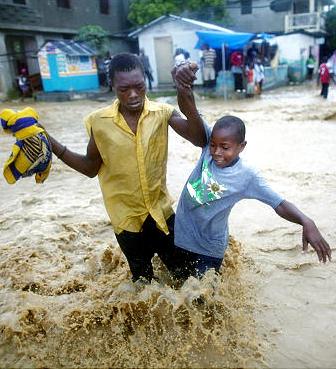
Premier appeals to public to help with Tomas aid
 (CNS): Cayman Airways will be sending a charter aircraft on Wednesday with relief supplies to islands in the region affected by Hurricane Tomas. The premier said his office in partnership with the Red Cross was spearheading a drive to gather much-needed supplies. “Having gone through similar experiences with Hurricanes Ivan and Paloma, the people of the Cayman Islands empathise with our friends and family in St. Lucia; St. Vincent and the Grenadines; Barbados; Haiti; and Cuba,” McKeeva Bush said. “We know the challenges and the gargantuan rebuilding effort that they now face.”
(CNS): Cayman Airways will be sending a charter aircraft on Wednesday with relief supplies to islands in the region affected by Hurricane Tomas. The premier said his office in partnership with the Red Cross was spearheading a drive to gather much-needed supplies. “Having gone through similar experiences with Hurricanes Ivan and Paloma, the people of the Cayman Islands empathise with our friends and family in St. Lucia; St. Vincent and the Grenadines; Barbados; Haiti; and Cuba,” McKeeva Bush said. “We know the challenges and the gargantuan rebuilding effort that they now face.”
Reports have revealed that in St. Lucia, one of the first places hit by Tomas, 14 lives were lost and several others are still missing. Estimates are that rebuilding will cost $500 million, and that it will be a year before reconstruction in some of the hardest hit areas of his island will be completed.
The premier pointed to those in Haiti, who were already struggling to survive following January’s epic earthquake and the recent cholera outbreak, now face the added misery that Tomas’ flood waters brought this past weekend.
“As these countries complete their damage assessments, we know their need for regional and international assistance will only increase. Consequently, the Cayman Islands Government is doing our part to assist our Caribbean neighbours,” Bush added.
.
Calling on the community for help he appealed to residents and corporate citizens in the private sector for assistance. “Working in close partnership with the Red Cross, we have a goal to collect the following items by close of business on Tuesday, 9 November,” he said as he listed the items needed. “Many in the region rallied to Cayman’s aid during our time of need in the months following Ivan and Paloma. Now, it’s our chance to return good for good.”
The items include cases of water; water purification tablets; dry, preserved and canned food (especially evaporated milk); blankets, sleeping bags and bedding (sheets, comforters, etc.); lanterns and flashlights, with the right-sized batteries; small transistor radios; adult and infant disposable diapers and wipes; female sanitary products; baby food and formula; cleaning supplies (including sanitary wipes, hand sanitizer), etc.; and water containers and flasks.
These items can be dropped off at the Red Cross, on Huldah Avenue or Cayman Airways Cargo facility on Airport Road.
The Cayman Islands Red Cross is also accepting cash donations. Contributions may be deposited in the following Bank of Butterfield accounts: KYD 02-201-035054-05 and USD 01-201-035054-02. For more information, call Red Cross Disaster Manager Hemant Balgobin on 925-0681 or email him at hbalgobin@gmail.com